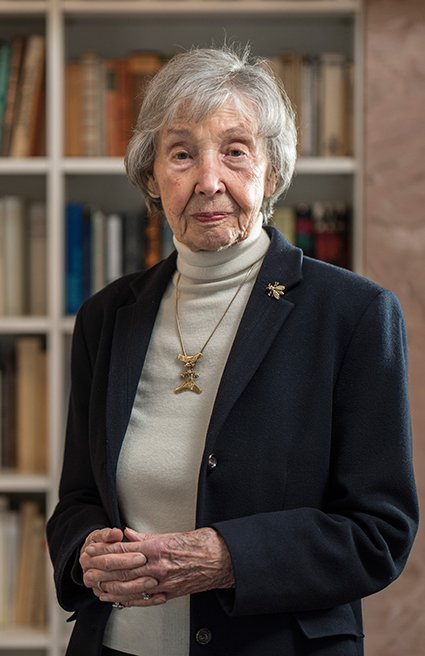A Pioneer of Post-War Sociology
The Founding Director of the Max Planck Institute for the Study of Societies turns 90
After an academic career that was in part shaped by her experience of living through the Second World War and the immediate post-war period, today Renate Mayntz is the grande dame of German sociology. As the Founding Director of the Max Planck Institute for the Study of Societies in Cologne, she led the Institute from 1985 to 1997. She will celebrate her ninetieth birthday on April 28, 2019.

Renate Mayntz occupies what is in many respects an exceptional position in the German research landscape. She is one of the outstanding social scientists of the post-war generation, the first female founding director of a Max Planck institute, and one of those rare scholars who remain research active over the age of 80. Renate Mayntz’s pioneering work on theories of society and social systems, political institutions, policy development and implementation, and transnational structures has been directional for sociology.
The road she traveled in her academic work led her to organizational sociology, political science, and finally to the study of societies. A core theme connects all of these research phases: the political element of social action, namely how approaches to political steering shape the dynamic of societal development.
In her research, Renate Mayntz has always been interested in questions of academic advice to policy makers. Her approach to the dissemination of knowledge gave weight to the importance of communication and cooperation with practitioners and praxis. In the 1970s, she participated in the Commission for the Reform of Public Administration and was a member of the Senate of the German Research Foundation. After the fall of the Berlin Wall, she was involved in the dissolution and restructuring of the Academy of Sciences of the GDR and the Berlin-Brandenburg Academy of Sciences and Humanities. She has engaged with the innovative organization of political and administrative decision making processes in a variety of policy fields.
In 1984 the Max Planck Society entrusted Renate Mayntz with founding the Max Planck Institute for the Study of Societies in Cologne (MPIfG). Together with the political scientist, Fritz W. Scharpf, she led the MPIfG until her retirement in 1997. Under their joint auspices, the Institute developed into a center for the investigation of the social and political foundations of modern societies.
Autobiographical writings
Renate Mayntz
Mein Weg zur Soziologie: Rekonstruktion eines kontingenten Karrierepfades. In Wege zur Soziologie nach 1945: Biographische Notizen, hrsg. von Christian Fleck, 225–35. Opladen: Leske + Budrich, 1996.
Renate Mayntz
Eine sozialwissenschaftliche Karriere im Fächerspagat. In Soziologie als Beruf: Erinnerungen westdeutscher Hochschulprofessoren der Nachkriegsgeneration, hrsg. von Karl Martin Bolte und Friedhelm Neidhardt, Bd. 11 von Soziale Welt, Sonderhefte, 315–29. Baden-Baden: Nomos, 1998.
Selected works
Sovereign Nations and the Governance of International Finance. In Critical Junctures in Mobile Capital, edited by Jocelyn Pixley and Helen Flam, 38–51. Cambridge: Cambridge University Press, 2018.
Handeln und Struktur, Akteur und System: Die kausale Rekonstruktion von sozialen Makrophänomenen am Beispiel der Finanzkrise. Zeitschrift für Theoretische Soziologie 1/2017: 5–26 (2017).
Negotiated Reform: The Multilevel Governance of Financial Regulation, ed. Frankfurt a.M.: Campus, 2015.
Die Finanzmarktkrise im Licht einer Theorie funktioneller Differenzierung. Kölner Zeitschrift für Soziologie und Sozialpsychologie 66 (1): 1–9 (2014).
Crisis and Control: Institutional Change in Financial Market Regulation, ed. Frankfurt a.M.: Campus, 2012.
Mechanisms in the Analysis of Social Macro-Phenomena. Philosophy of the Social Sciences 34 (2): 237–59 (2004).
Akteure – Mechanismen – Modelle: Zur Theoriefähigkeit makrosozialer Analysen, Hg. Frankfurt a. M.: Campus, 2002.
Soziale Dynamik und politische Steuerung: Theoretische und methodologische Überlegungen. Franfurt a.M.: Campus, 1997.
Gesellschaftliche Selbstregelung und politische Steuerung, Hg., mit Fritz W. Scharpf. Frankfurt a. M.: Campus, 1995.
The Development of Large Technical Systems, ed. with Thomas P. Hughes. Frankfurt a.M.: Campus, 1988.
Implementation politischer Programme: Ansätze zur Theoriebildung, Hg. (Band I 1980, Band II 1983). Opladen: Westdeutscher Verlag.
Soziologie der Organisation. Reinbek bei Hamburg: Rowohlt, 1963.
